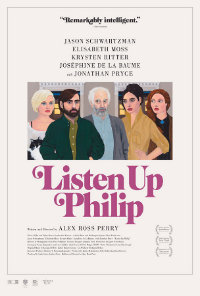Philip A. Dick: Perry’s Literary Minds Stuck In a Lonely Place
 Following up his dark hearted homage to road trip cinema with 2011’s The Color Wheel, Alex Ross Perry’s third film, Listen Up Philip arrives with an equally unpleasant set of main characters as it explores the hyper intellectual worldview of self-important authors wallowing in their emotional ennui. But the self-involved narcissists occupying Perry’s arena also happen to be impressively fleshed out compelling characters that makes this triptych of their miserable emotional periods so engrossing. Sprawling, unkempt, and often unlikeable, it’s one of the most impressively written and astutely performed films you’ll see this year.
Following up his dark hearted homage to road trip cinema with 2011’s The Color Wheel, Alex Ross Perry’s third film, Listen Up Philip arrives with an equally unpleasant set of main characters as it explores the hyper intellectual worldview of self-important authors wallowing in their emotional ennui. But the self-involved narcissists occupying Perry’s arena also happen to be impressively fleshed out compelling characters that makes this triptych of their miserable emotional periods so engrossing. Sprawling, unkempt, and often unlikeable, it’s one of the most impressively written and astutely performed films you’ll see this year.
We meet Philip (Jason Schwartzman) as he meets up with an ex-girlfriend for lunch, basically to gloat over his looming success as an author, celebrating the publication of his first novel. An omniscient narrator (Eric Bogosnian) begins to guide us through Philip’s (and eventually, other characters’) inner turmoil. The interaction with his ex, who is thirty minutes late, is our first whiff of Philip’s growing abrasiveness. He’s been slowly drifting away from his live-in girlfriend, Ashley (Elisabeth Moss), a successful photographer who is proud of and has been supporting Philip. Life continues in this fashion until the eve of the publication of his second novel (mysteriously titled “Obidant”). While panned by the New York Times, Philip’s idol, Ike Zimmerman, a notable literary figure, loved the novel, and requests a meeting with Philip. Delighted, they quickly develop a sort of master/protégé dynamic and Philip scoots off to write another novel at Ike’s summer house upstate, much to the chagrin of Ashley. The move becomes the beginning of a major shift in all of their lives.
As the titular Philip, Schwartzman’s performance is one of his best in years. It’s the type of character that could have easily lapsed into monstrous bleakness (Adam Scott’s character in The Vicious Kind comes to mind), imbued as he is with a kind of nonchalant misogyny that recalls Perry’s influence for the film, Bret Easton Ellis. In fact, Listen Up Philip is reminiscent of the sort of neurotic masculinity often explored in Woody Allen’s work (the omniscient narration of Eric Bogosnian helps, for example, and Allen’s 1992 film Husbands and Wives has been discussed as a point of reference), though Perry’s characters are driven to darker realms than Allen’s wounded males, reaching the sort of irreparable apathy that aligns the film with the darkness of Ellis.
Likewise, the freewheeling camera of Sean Price Williams (Perry’s usual DP), recalls the feverishness of John Cassavetes, grasping close-ups in cramped spaces as if the camera is engaging in the emotional tumult. A party scene in Pryce’s living room recalls the desperation of the London trip in Husbands (1970), where reality strikes through forced shenanigans like a piercing arrow.
The incomparable and often underrated Jonathan Pryce is pitch perfect as Ike Zimmerman, an embodiment of the monstrous genius of the once prized author, a role that’s clearly been diminished in today’s hyperactive minded culture, an amalgamation of personalities like Mailer, Roth, or Vidal. And thus, Perry’s film purposefully tries to forego any obvious references to the modern world’s immersion in social networking, creating an ambience of a time and way of living from days long gone, when isolation of the sort fetishized here is no longer a possibility.
But as great as Pryce and Schwartzman are here, Elisabeth Moss nearly walks away with the film as Ashley. Moss has a distinct talent for portraying emotionally wounded women, and while her character’s predicament could be similarly described as the one she’s dealt in another great 2014 title, The One I Love, her Ashley is another wholly original personification. And Perry has a host of excellent supporting roles for the likes of Dree Hemingway, Kate Lyn Sheil, Josephine de La Baume, and Jess Weixler, a cadre of wonderful actresses that get a standout scene or two. Most surprisingly, Krysten Ritter is at her most resonant ever as Pryce’s damaged daughter.
With such an amazing landscape of characters, Listen Up Philip does feel a bit sprawling, but the level of commitment and conviction to the portrayal of such complicated people seems unprecedented in a landscape of indie films too fearful of presenting us with characters deemed unlikeable. All people are unlikeable in some regard if you really get to know or spend enough time with them. What matters is how realistically, how entertainingly, and how completely these characters are presented.
An appeasing hybrid of the novelistic and cinematic form, Listen Up Philip is a throwback to vintage traditions in entertainment, back when quality seemed to matter. Perry’s film is an aggravating, arrogant, and entertaining portrait of the toxicity of ill-suited relationships and the narcissistic danger of letting success consume your livelihood. And like those friends you keep around despite their innate flaws, it’s a film worthy of reveling in.
Reviewed on August 9th at the 2014 Sundance Next Film Festival.
★★★★/☆☆☆☆☆


